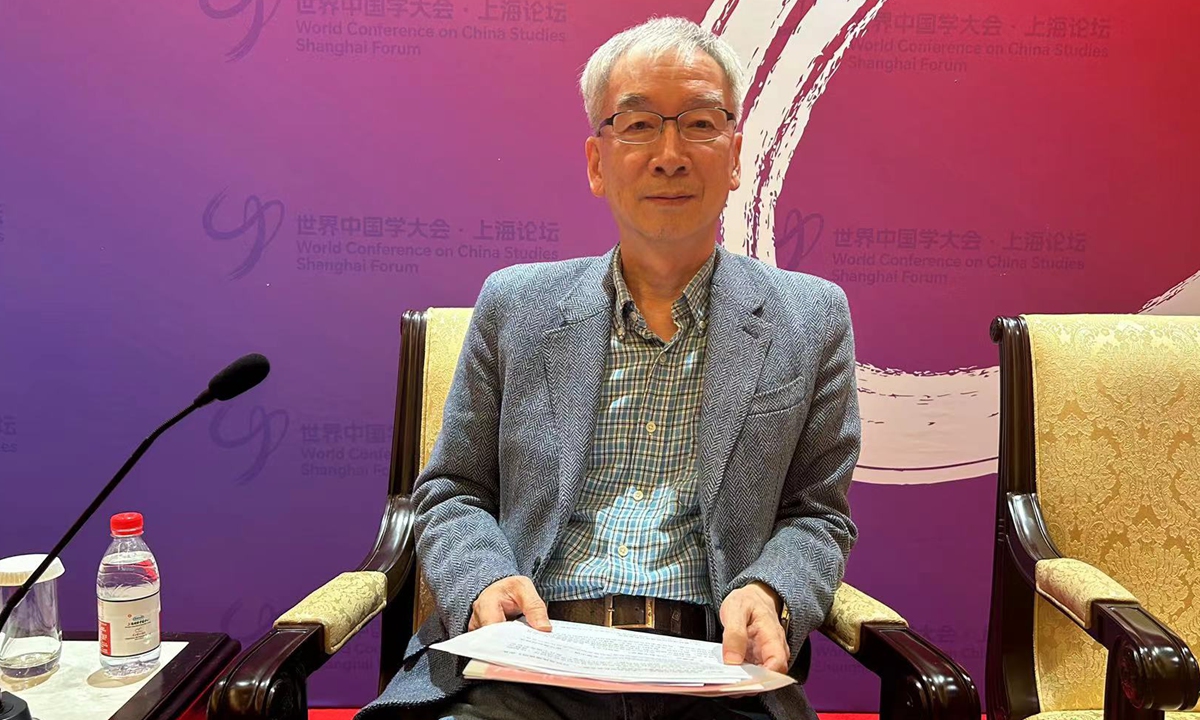Timothy Brook visited China for the first time in the 1970s, and has returned to the country many times since then to conduct deep exchanges with Chinese scholars.
A specialist in Chinese history, Brook is particularly fascinated by the Ming Dynasty (1368-1644), and has published several books and academic papers on the topic over the decades. His latest book, The Price of Collapse: The Little Ice Age and the Fall of Ming China, was published by Princeton University Press in November.
“One of the reasons why I’m so interested in the Ming Dynasty is that it was the beginning of the dialogue between China and Europe that continues to this day,” Brook said, speaking in fluent Chinese, on Thursday. “Europeans began to come to China in the 16th century,” he noted.
A broad global context
Unlike a lot of other China scholars, Brook’s observations usually situate China in a broad global context, and present the connection between China and the West. “China and the world should understand each other better,” said Brook, noting that both Westerners and Chinese people should understand their history differently.
He suggested that today’s young international scholars should look at China in a more global context, especially in the era of globalization, when mutual learning among civilizations matters greatly.
“You have to not only immerse yourself in Chinese culture and language, but also immerse yourself in the world – use the knowledge of where you come from, and bring that to bear on the knowledge that you gain about China,” Brook told the Global Times. However, doing this is “not easy.”
Hailed as one of the best storytellers among North American historians, Brook has found a broad readership both in China and overseas for his many books, such as The Confusions of Pleasure: Commerce and Culture in Ming China and Vermeer’s Hat: The Seventeenth Century and the Dawn of the Global World.
The books open a window for international readers to learn more about Chinese history and civilization.
“I keep writing books about China in order to increase the outside world’s understanding of China,” said Brook. It’s important to let foreigners know that Chinese history is not something far away, strange or difficult to understand, he noted.
For Chinese readers, Brook’s observations and insights offer a precious “outsider” perspective.
“Even though I will never fully understand China as an ‘insider’ does, this ‘outsider’ has crafted ideas and insights that may help us to achieve a more objective and universal knowledge of China, and not just of China on its own terms and for itself, but of China as part of the world, which is, after all, where we all live,” Brook said in an acceptance speech at the forum on Friday.
Looking through Baik Young-seo’s books and academic papers, “East Asia” is probably one of the most frequently mentioned terms. As the first South Korean scholar to win the Award for Distinguished Contributions to China Studies, Baik adds a valuable South Korean perspective to the world’s current China studies, much of which is based on observations from the West.
“Compared with countries in other areas like Latin America or Europe, countries in East Asia share more common ground among civilizations,” Baik said on Thursday, in response to a question raised by the Global Times.
East Asian countries enjoy some common civilization assets, Baik said. Nonetheless, “[We should] not only explore which of the assets can be shared, but also make greater efforts in analyzing and researching which of the assets can help the actual development of this area,” he said.
Baik recalled that after 1992, when China and South Korea established diplomatic relations, exchanges between the two countries became increasingly frequent, which enhanced regional thinking on East Asia. Since then, Baik has studied the history and reality of China from an East Asian perspective.

Baik Young-seo Photo: Huang Lanlan/Global Times
‘Inclusiveness and flexibility’
Baik has served as president of the Korean Association for Contemporary Chinese Studies and the Korean Association for Studies of Modern Chinese History. His major books, including Returning of East Asia and East Asia as Intellectual Thought, have had a wide influence on the academic community of China studies in both China and South Korea.
“What I like most about Chinese civilization is its inclusiveness and flexibility,” said Baik. East Asian countries should “respect each other’s differences, eliminate contradictions, and enhance their ability to listen to each other,” he told the Global Times.
“In the early 1970s, I became interested in China mainly because I wanted to reflect on South Korea by learning from China,” he said in fluent Chinese in an acceptance speech at the forum on Friday. Nowadays, China studies needs mutual learning and a reference to related countries including South Korea, he added.
Having been to China many times, Baik has built good friendships with Chinese scholars in recent decades. He said that in China, he sometimes enjoys hot pot and Chinese liquor with Chinese historians such as Xu Jilin, who was also present at the event on Thursday.
“I do not study China’s history and modern reality from the perspective of a ‘spectator,'” Baik said. “I’m a participant.”








